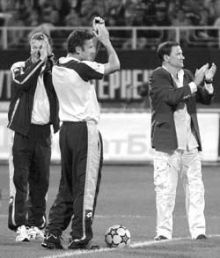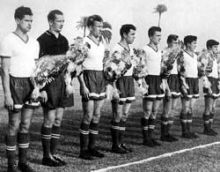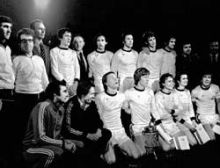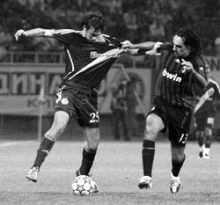Nobody knows the precise date when the Dynamo Kyiv Club was born. That’s why Dynamo’s 80th jubilee was celebrated for a whole year. The celebrations culminated in a friendly match between Dynamo and Milan. The game between the champion of Ukraine and the European Champions Cup winner ended in a 2:2 tie. This was preceded by a tribute to Dynamo veterans, and the festivities wound up with a pop concert. Here is a rundown of the main landmarks in the biography of Ukraine’s all-time best team.
JUST A TEAM
The soccer team of the Kyiv branch of the Dynamo Proletarian Sport Association, founded on May 13, 1927, did not play any official matches that year, which led some researchers to cast doubt on the true founding date of this world-famous team. These researchers are correct in claiming that there was no club called Dynamo in 1927; neither was there one in 1937, 1947, or even 1987. What is known today as the Dynamo Soccer Club only began to be formed in the late 1980s. This logic suggests that Dynamo did not exist in the first 60 years of its history, which is wrong, of course. In the past 80 years Dynamo’s status changed frequently, but this is not grounds for interrupting the history that began on May 13, 1927.
Dynamo Kyiv was originally just a soccer team that included members of the NKVD (Soviet secret police) sports association. But the first Dynamo players were not exclusively NKVD employees, i.e., members of the militia and other law-enforcement bodies. Any amateur team wants to be a winner, not just to play soccer. Nobody in Dynamo Kyiv was going to wait around for the Kyiv militia to produce talented players. The team invited anybody who could improve its performance. This was common practice for amateur teams at the time — not just in Kyiv but all over the USSR. The point is that NKVD could offer Dynamo novices certain benefits that were inaccessible to teams from other agencies.
The first managers of Dynamo Kyiv, NKVD staffers Kesselman, Barminsky, and Ivanov, were neither able soccer players nor professional coaches. Dynamo got its first real coach only 10 years later. The three bosses simply liked soccer and assisted the team as much as they could: they helped talented players, even from other cities, to join the NKVD and provided them with more or less decent living conditions in those difficult times.
In 1932-33 Dynamo Kyiv players managed to save themselves from starving to death in the famine by setting out on months-long tours to the republics of the Transcaucasus, where there was no famine.
In those first years Dynamo did not produce any achievements in their sport. The team only played in intercity and departmental competitions. At the time, championships were held between cities, regions, and the Soviet Union’s constituent republics. Dynamo played for both Kyiv and Soviet Ukraine. Until 1936 these were most friendly matches.
THE TEAM OF SOVIET UKRAINE’S CAPITAL
In 1935 the Soviet sports leadership decided to continue holding a USSR soccer championship of its “showpiece master teams,” which were in fact professional teams of sports associations and agencies. These “master teams” were divided into A, B, and C classes. In the very first Soviet championship, Dynamo Kyiv, the only team from the Ukrainian SSR, was included in Class A. Had this happened one or two years earlier, Class A could have had a Dynamo from Kharkiv, not Kyiv, because Kharkiv was then the capital of Soviet Ukraine, and until 1934 it was Kharkiv teams that were winning most of the soccer championships. That year the very existence of the Dynamo Kyiv team was in question. Politics stepped in with a helping hand, when Ukraine’s capital was transferred from Kharkiv to Kyiv. Since then Kyiv has been the longtime “soccer capital” of Ukraine.
If we want to have an unbiased account of Dynamo Kyiv’s further history we must remember that the title of Ukraine’s best team was in fact granted to Dynamo Kyiv by the USSR’s political leadership. The Kyiv players could compete in earnest only with teams from Moscow, Leningrad, and other constituent republics. No one knows how this sports struggle would have developed if war had not broken out on June 22, 1941.
Every soccer buff must have heard the story of the game that Dynamo Kyiv was supposed to play against TsSKA (Central Sports Club of the Army) Moscow on June 22 at the brand-new Kyiv Khrushchev Stadium. Naturally, the match was canceled. But very few people know that more than 50,000 spectators came to the stadium that day: they were not aware of what kind of war had begun. The players, too, were told that the game was being put off for a short time.
In fact, that was the last day of the prewar Dynamo Kyiv whose players had not won any resounding victories but nevertheless laid the groundwork for the future great team. I am deliberately not naming the coaches and players of those times because all of them should be named — those who survived the war and those who died on the battlefield and in occupied Kyiv. A newspaper article is too small to encompass such a list.
JUST A GOOD TEAM
In the postwar years or, to be more exact, in the first 20 years after the war, Dynamo Kyiv was just one of many soccer teams. The Dynamo team played interesting soccer, and spectators filled the grandstands of stadiums (first Dynamo and then Central Stadium) for every game. But the Kyiv squad still had a long way to go to reach the heights of Soviet soccer. There were many reasons for this, especially the war, which claimed the lives of an entire generation of Ukrainians, Kyivites in particular.
In those years Dynamo Kyiv was usually run by Moscow— and Leningrad-based coaches. Leningrad native Oleg Oshenkov helped the team win the first USSR Cup in 1954, while the Muscovite Leonid Soloviov steered Dynamo to the first champion’s title in 1961. The leading players of those years were usually not Kyiv natives either. Dynamo Kyiv owed its successes to guest players, like the Ossetinian Andrei Zazroev, the team’s captain in 1954, and the Russian Yurii Voinov, the team’s best player in the late 1950s and early 1960s.
It was only in the early 1960s that the key positions in Dynamo Kyiv were taken by Kyivites, boys who had grown up in postwar Kyiv and dreamed of big- time soccer. Even today, 50 years later, every Kyiv native is familiar with the names of Viktor Kanevsky, Oleh Bazylevych, and Valerii Lobanovsky. These players were the idols of sports fans and turned soccer into the favorite game of all Kyiv residents — from ordinary blue-collar and white- collar workers to the top-ranking leaders of Soviet Ukraine.
A CHALLENGE TO MOSCOW
The Soviet state always needed sports victories. In the communist leaders’ view, these victories confirmed the advantages of the USSR’s social system over Western countries. But victories in soccer were not a cakewalk. The USSR national soccer team had very few chances of becoming world champions. This is why the top leaders in Moscow were more interested in hockey than soccer.
Under these circumstances, the leaders of the Union republics could increase their USSR-wide prestige by means of soccer. This especially applied to Ukraine and Georgia. Dynamo Kyiv and Dynamo Tbilisi were the national teams of their republics because they were provided with all possible facilities.
This broke Moscow’s hegemony, and from 1964 onwards the title of USSR soccer champion was more often won by a non-Moscow team.
The best players from Kyiv, Tbilisi, Yerevan, Baku, Minsk, Tashkent, and Alma-Ata were not lured to Moscow, as were, say, basketball players or track- and-field athletes. It was almost officially allowed to throw out a “soccer challenge” to Moscow. All you had to do was form proper teams.
Dynamo Kyiv was always the best of these teams. Under the guidance of coach Viktor Maslov, the 1960s Dynamo players transferred the USSR soccer capital to Kyiv. Gradually, Kyivites began to form the backbone of the USSR national team. Dynamo Kyiv’s Viktor Serebrianikov, Andrii Biba, Volodymyr Muntian, Anatolii Byshovets, Jozsef Szabo, Yevhen Rudakov, Vitalii Khmelnytsky, and many others were celebrities of Kyiv and all-Soviet soccer.
A CHALLENGE TO EUROPE
Already by the late 1960s, when Dynamo Kyiv started playing in official international club tournaments, USSR-only titles had ceased to satisfy the fastidious Kyiv fans. Kyiv craved international victories. In this they were in agreement with the coaches Valerii Lobanovsky and Oleh Bazylevych, who in the 1970s formed the legendary Dynamo Kyiv of European fame.
From that time on, for almost 15 years Kyiv players and their irreplaceable coach Lobanovsky regularly fought for victory not only during USSR championships but also in the international arena as part of both Dynamo and the Soviet national team, which from 1974 was in fact a “branch” of Kyiv’s dream team. Those people who used to joke that the Soviet national team was “a weaker version of Dynamo Kyiv,” were close to the truth.
Dynamo Kyiv’s record of international achievements in the 1970s and 1980s included two Winners’ Cups, the Supercup of Europe, two entries into the Champions Cup semifinals, qualifying for the European Championship final as part of the Soviet national team, and third place as part of the Soviet Olympic team. All this was won against the backdrop of acute rivalry in domestic competitions, where Dynamo was robbed of champion titles, Cup winners, or silver and bronze medals only a handful of times. More than 30 Dynamo players attained national and international acclaim during this period, while Oleh Blokhin and Ihor Belanov were voted the best soccer players of Europe.
But politics intervened again. The collapse of communism ruined the Soviet soccer system, which had been developing for more than 50 years. Soviet soccer, with its championships and “showpiece masters’ teams,” has sunk into oblivion. But Dynamo Kyiv remained intact.
A PROFESSIONAL CLUB
The first steps to turn Dynamo Kyiv into a professional soccer club were taken on Lobanovsky’s initiative in the final years of the USSR’s existence. But Dynamo became a real professional club only in 1993, when Hryhorii Surkis was elected its president. The new president faced the problem of not only forming a full-fledged club Dynamo Kyiv but also building the entire soccer system of independent Ukraine, starting with the professional league and ending with the system of national teams. This two-pronged work was carried out concurrently. A new base for the club and the national team was built, as were new soccer pitches. After returning to Dynamo from abroad, Lobanovsky helped the club regain its international prestige. The national team of Ukraine, mostly consisting, like in the Soviet era, of Dynamo Kyiv players, began to gain international recognition. The best member of Dynamo, Andrii Shevchenko, became one of the world’s finest players. The main reforms were completed in the late 1990s, when Dynamo Kyiv and Ukrainian soccer were given a new lease on life.
FIGHTING FOR VICTORY
Today’s Dynamo, headed by Ihor Surkis after Hryhorii Surkis was elected president of the Soccer Federation of Ukraine, is now a 21st-century club. The championship of Ukraine is showing an acute rivalry with Shakhtar Donetsk, a new contender for leadership. The coaches who came after Lobanovsky are seeking paths of progress. The team is supplemented by players from various countries. Dynamo is striving to be one of the best clubs in Europe, qualifying every year for the Champions League group tournament. The club is developing its structure and raising new soccer talents in the Dynamo school.
Since 1927 everything has changed in the last 80 years — from the state itself, the political system, and economic relations to the game of soccer, which is an important part of international life, not just a game for aficionados. Today no one remembers the whole history of Dynamo Kyiv. The past years have left behind tournament charts, game records, awards, and medals. Together with the reminiscences of Dynamo players of all times, all this comes together in a great soccer history that should be remembered not just during jubilee celebrations. One should always remember history and inscribe new victories in it. This is our wish for Dynamo Kyiv on its 80th birthday!











